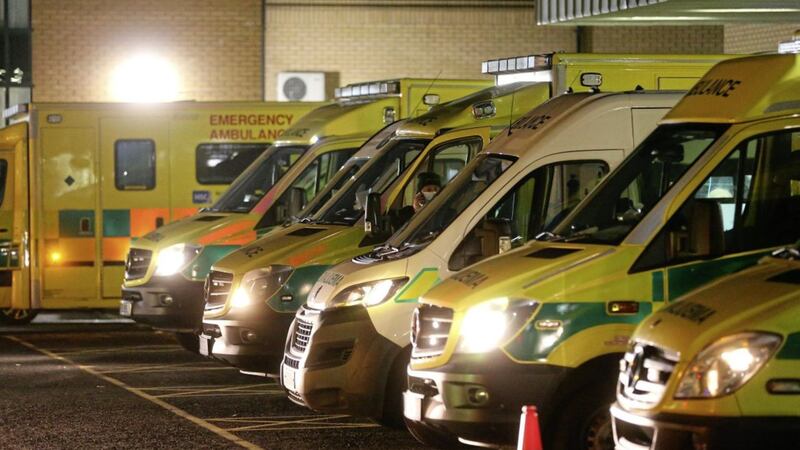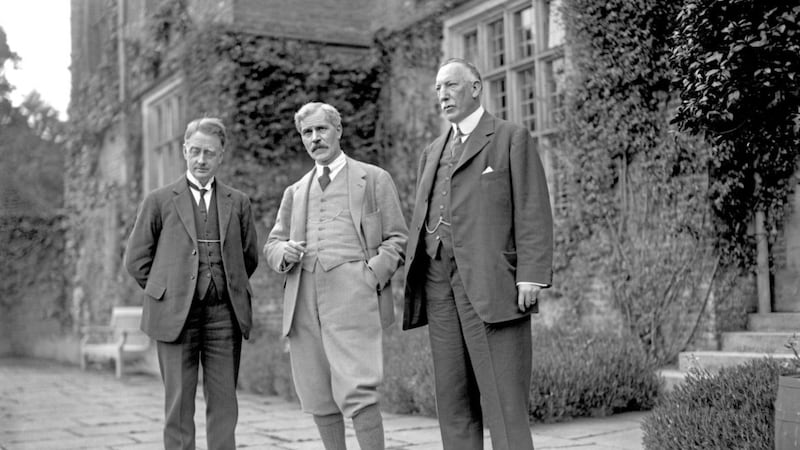IT is a year to the week since the 2019 general election, which in Northern Ireland turned unexpectedly on the state of the health service.
Hospitals were in crisis and waiting lists were 1,000 times longer than in England, which has 30 times our population.
Voters ignored Brexit and indeed Westminster to demand a return of devolution.
The resulting Alliance surge convinced the DUP and Sinn Féin to bury their differences - although both still refused to take on the Department of Health.
All that bears repeating as Covid overwhelms our hospitals, with weeks of further rises to come.
Last December might feel like a previous age but all its trends still apply and none of its problems have been fixed.
Stormont was restored to stop the NHS collapsing. The epidemic that obscured that is about to bring it to a head.
**
UUP health minister Robin Swann should not be above criticism but it was bizarre of prominent epidemiologist Dr Gabriel Scally to call for his resignation on RTÉ radio over rising Covid cases.
Swann demanded tougher lockdown measures at the start of the current wave in November, only to be blocked by a DUP executive veto.
Scally should know this, having complained about it at the time.
A former adviser to a Labour health minister, Scally gives the impression of just not liking the UUP very much - a valid political view but not a valid scientific one.
**
DUP economy minister Diane Dodds has revealed her department will be over £70 million short next year due to lost EU funding, mostly on Invest NI programmes for research, development and support for small to medium enterprises.
Other assembly members quickly noted the irony of Dodds, previously Northern Ireland's only pro-Brexit MEP, taking the biggest financial hit of any minister.
However, there are deeper ironies. Invest NI has shifted to more targeted programmes because the EU has been progressively banning its traditional model of straight subsidies to inward investors.
Brexit means Britain can return to that model, subject to any level playing field requirements in a trade agreement.
But Northern Ireland cannot, as the withdrawal agreement binds us to EU state aid rules on goods. So Invest NI has lost freedom and funding - the worst of both words.
**
The sea border increasingly looks less obstructive than feared, which is just as well.
Businesses moving goods between Britain and Northern Ireland will be relying on help from the Trader Support Service, set up by HMRC and outsourced to Fujitsu.
The Sunday Times has discovered it is trying to recruit the hundreds of "customs and trade advisers" it needs on salaries of between £20,000 and £25,000.
Advertisements specify two years' experience in "global trade". Anyone with any experience in this field has been able to name their price for the past several years, with a pick of great jobs all over the world.
The one HMRC recruit the Sunday Times found was a young former Uber driver who took three weeks of online instruction and will be working from his bedroom at his parents' house in east London.
In another ominous portent, the Dock Street junction in Belfast, which is to the sea border what the Cloghogue Roundabout is to the land border, collapsed into a Victorian sewer last weekend as trade talks went over their deadline.
**
The government's bombast about sending the Royal Navy after French trawlers has been followed by SNP bombast about not letting the Royal Navy into Scottish waters.
This has highlighted that while defence is a reserved matter, fisheries protection is a devolved matter.
The devolved nations all have their own fisheries protection fleets but can summon the Royal Navy for further assistance via a Military Aid to the Civil Authorities (MACA) request - the same mechanism that caused controversy at Stormont over army help with Nightingale hospitals.
The only thing more incredible than the potential for mischief here is that it has gone so unnoticed.
**
January's New Decade, New Approach deal promised an independent review of education, to examine among other things "the prospects of moving towards a single education system".
DUP minister Peter Weir has now initiated this process by publishing the review's terms of reference.
Academic selection gets only one passing mention, perhaps unsurprisingly given Weir's refusal to cancel transfer tests this year.
But the five-person panel to be appointed will certainly call for its abolition, like all other experts before them.
The terms of reference, which have to be non-prescriptive, also require the review to define "what a 'single education system' means and would entail in practical terms".
It is hard to see how it would not mean ending academic selection.
**
One sea border problem still not pinned down is the transfer of plants.
Horticultural firms in England say they are particularly concerned about trees, which they export to Northern Ireland in large numbers.
As things stand, these can no longer be shipped.
Bad news for one of the DUP's centenary projects in New Decade, New Approach - the planting of a 'Great Ulster Forest'.








